Free Child Power of Attorney Forms
A power of attorney for child form is similar to the power of attorney form you fill our for yourself (as principal), but not quite the same. Where an adult power of attorney can cover specific financial or medical powers, a child power of attorney form does that and can confer temporary guardianship of a child.
These forms are incredibly useful for any situation where you need to ensure that your child is well-cared for and cannot perform that care for yourself. There are some limitations, however, and different state laws treat these forms differently.
It’s always important to consult with local statues if you need to create an attorney for a minor. This guide will help you get started and will outline the process so that you can move forward as soon as you know what a power of attorney for child will be honored in your area.
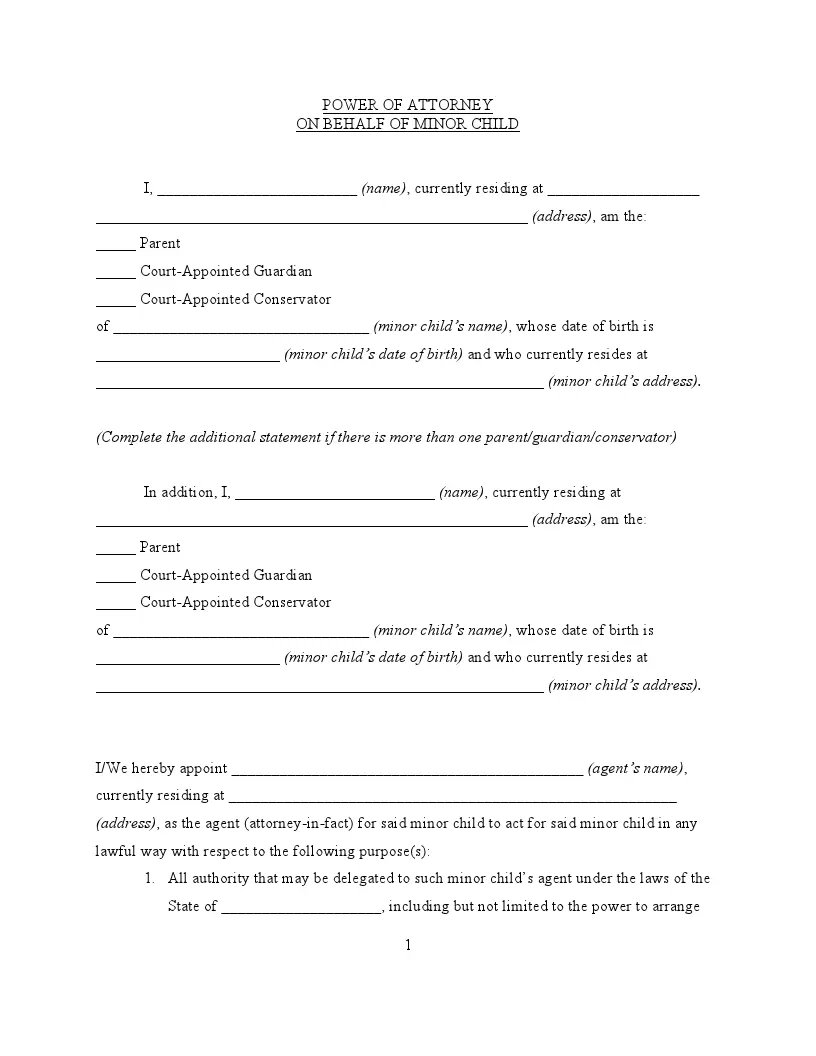
Build Your Document
Answer a few simple questions to make your document in minutes
Save and Print
Save progress and finish on any device, download and print anytime
Sign and Use
Your valid, lawyer-approved document is ready
- Alabama
- Alaska
- Arizona
- Arkansas
- California
- Colorado
- Connecticut
- Delaware
- Florida
- Georgia
- Hawaii
- Idaho
- Illinois
- Indiana
- Iowa
- Kansas
- Kentucky
- Louisiana
- Maine
- Maryland
- Massachusetts
- Michigan
- Minnesota
- Mississippi
- Missouri
- Montana
- Nebraska
- Nevada
- New Hampshire
- New Jersey
- New Mexico
- New York
- North Carolina
- North Dakota
- Ohio
- Oklahoma
- Oregon
- Pennsylvania
- Rhode Island
- South Carolina
- South Dakota
- Tennessee
- Texas
- Utah
- Vermont
- Virginia
- Washington
- West Virginia
- Wisconsin
- Wyoming
What is a Power of Attorney for a Child?
A power of attorney for a child is a form that acts as a temporary delegation of parental authority. That means that the Principal (the parent) can designate an attorney-in-fact or agent for their child. That person is typically a family member, but you can also appoint a close friend if they are the best choice for you and your child.
These forms give the agent child care authorization, which can be customized to meet your specific circumstances. Your child’s agent might be empowered to make medical decisions, enroll your child in a school and meet with teachers, access school records, and more.
There are plenty of situations where it might be helpful to have a child power of attorney. Here are some common examples:
- Emergency contact in case parents cannot be reached
- Parent is deployed for military service overseas
- International travel without the child
- Parent(s) are ill or will be in the hospital for an extended time frame
- Parents(s) are incarcerated
- Any other reason the parents may be incapacitated or unable to be contacted
These forms might also be required for some activities if you are unable to accompany your minor child. The forms allow you to send someone else in your place and are often required if there is a risk of injury. That way, your child always has an agent available to make healthcare decisions.
A parental power of attorney is different from guardianship or a transfer of custody. Legally speaking, these forms are tricky because it takes quite a bit to remove parental custody over a child, but a temporary delegation of parental authority is also tricky.
However, especially in cases like military duty where the parent is clearly acting in their child’s best interest, these POAs are more likely to be upheld. Individual states may also have other arrangements that allow a parent to create an agent for their child.
These forms are typically only used for a specific period of time. They are not designed to be indefinite and will need to be renewed after the specified period of time has passed.
That’s different from the medical power of attorney and other adult POA that are only time-limited if the principal decides the form should be.
Child POA vs. Custody
It might sound like custody and child power of attorney are very similar, but the two shouldn’t be confused. A child power of attorney gives the child’s agent the right to make decisions for the child’s welfare. That agent may temporarily take care of the child, but isn’t permanent.
A child POA can also be filled out without the courts, though it is important to see a notary public and make sure the forms are filled out properly, signed, and witnessed.
Custody, on the other hand, is determined by the courts. Custody of a child can be assigned in case of divorce where one parent might be awarded full custody of the child or both parents may receive joint custody. Custody cases can also be used to take custody away from a parent that is deemed unfit to care for a child.
When the custody of a child is assigned, it’s usually a permanent arrangement. Child POA is usually limited to a specific period of time and expire. Custody also provides all the parental rights over a child while a POA can be more limited to only the rights and responsibilities the principal (usually the child’s parent) allows.
Child POA vs Guardianship
Guardianship papers are another court-ordered power, unlike the power of attorney for a child set up by their parent. These two legal authorizations can be used similarly, both are sometimes necessary for your child’s welfare, and both are temporary.
The main difference is that a POA is set up by the parent and is limited by the powers their grant on behalf of their minor child, while guardianship is set up by the courts, and includes the powers defined under state law for a guardian.
Both agents and guardians have the right to make decisions for a minor child. While a guardian might not be called a minor power of attorney, they generally have the same privileges. Guardians do also usually have the added responsibility of housing and caring for the child, which a power of attorney for a child may not.
Child POA vs. Conservatorship
Conservatorship is financial while a power of attorney for a child usually covers matters of their wellbeing and medical power of attorney.
A court may appoint a conservator for a minor if they come into a substantial amount of money before they are old enough to handle that money responsibly. That could be the result of an inheritance or personal injury claim. Sometimes Conservatorship is also considered necessary if a minor earns substantial income.
That can happen in the case of musicians and child actors.
A POA for a minor is more focused on giving an agent the authority to make medical decisions along with other important decisions for their well-being. It’s less concerned with managing an inheritance, property, or large sum of money.
Children’s parents are typically given conservator authority when it’s needed, unlike guardianship where parental rights are assigned to someone else.
A conservatorship over a minor usually expires when the minor comes of age unless the conservator can prove a physical or mental reason for the conservatorship to continue.
| Who Creates It? | What Does It Do? | How Long Does It Last? | |
| Child Power of Attorney | Usually created by a parent or guardian. | Grants limited rights for making decisions about the health and welfare of the child. | Typically, these forms are temporary and can be set up to last for 6 months to a year or longer. The documents expire on the specified date and must be renewed. |
| Custody | The Courts | Grants permanent parental rights over a child. | Custody is usually permanent unless contested in court. It can be assigned to one or more individuals at the court’s discretion. |
| Guardianship | The Courts | Grants temporary parental rights over a child. | Guardianship is used in cases where a child needs an adult with parental authority temporarily. Sometimes used in cases where a parent is temporarily incapacitated or attempting to prove their fitness to care for their child. |
| Conservatorship | The Courts | Grants the power to manage a minor’s finances in cases where the minor has a substantial inheritance, claim, or earnings. | Conservatorship is often granted to a minor’s parents in cases where the minor has enough money that it’s warranted. In some circumstances another relative or qualified professional may be granted conservatorship instead. |
Minor Child Power of Attorney Time Limits by State
| STATES | TIME LIMITS | STATE LAW |
| Alabama | One Year | Alabama Code, Section 26-2A-71 |
| Alaska | One Year | Alaska Statutes, Section 13.26.066 |
| Arizona | Six Months | Arizona Revised Statutes, Sections 14-5104 and 14-5107 |
| Arkansas | – | Arkansas Annotated Code, Section 28-68-213 |
| California | – | California Probate Code, Sections 1510-1517 |
| Colorado | One Year | Colorado Revised Statutes, Section 15-14-105 |
| Connecticut | – | Connecticut Revised Statutes, Chapter 802h, Section 45a-622 |
| Delaware | – | Delaware Code, Title 13, Sections 2320-2328 |
| Florida | – | Florida Statutes, Section 744.3021 |
| Georgia | – | Georgia Code, Sections 19-9-120 to 19-9-129 |
| Hawaii | One Year | Hawaii Revised Statutes, Section 560:5-105 |
| Idaho | Six Months | Idaho Statutes, Section 15-5-104 |
| Illinois | – | Illinois Compiled Statutes, Chapter 755, Section 45 |
| Indiana | Six Months | Indiana Code, Section 29-3-9-1 |
| Iowa | N/A | No Statute |
| Kansas | One Year | Kansas Statute, Section 38-2403 |
| Kentucky | – | Kentucky Revised Statutes, Section 27A.095 |
| Louisiana | – | Louisiana Civil Code, Articles 2989-3026 |
| Maine | One Year | Maine Probate Code, Title 18-C, Section 5-127 |
| Maryland | N/A | No Statute |
| Massachusetts | – | Massachusetts General Laws, Chapter 190B, Section 5-202 |
| Michigan | Six Months | Michigan Compiled Laws, Section 700.5103 |
| Minnesota | – | Minnesota Statutes, Section 257B.04 |
| Mississippi | N/A | No Statute |
| Missouri | One Year | Missouri Revised Statutes, Section 475.602 |
| Montana | Six Months | Montana Annotated Code, Section 72-5-103 |
| Nebraska | Six Months | Nebraska Revised Statutes, Section 30-2604 |
| Nevada | Six Months | Nevada Revised Statutes, Section 159.205 |
| New Hampshire | N/A | No Statute |
| New Jersey | – | New Jersey Statutes, Section 3B:12-74 |
| New Mexico | Six Months | New Mexico Annotated Statutes, Section 45-5-104 |
| New York | – | New York Court Acts, Section 661 |
| North Carolina | – | North Carolina General Statutes, Sections 32A-28 to 32A-34 |
| North Dakota | Six Months | North Dakota Century Code, Section 30.1-27 |
| Ohio | – | Ohio Revised Code, Sections 3109.52-3109.61 |
| Oklahoma | One Year | Oklahoma Statutes, Sections 10-700 and 10-701 |
| Oregon | Six Months | Oregon Revised Statutes, Section 109.056 |
| Pennsylvania | N/A | No Statute |
| Rhode Island | N/A | No Statute |
| South Carolina | N/A | No Statute |
| South Dakota | N/A | No Statute |
| Tennessee | – | Tennessee Code Annotated, Sections 34-6-301 to 34-6-310 |
| Texas | – | Texas Senate Bill 1598 |
| Utah | Six Months | Utah Code, Section 75-5-103 |
| Vermont | N/A | No Statute |
| Virginia | N/A | No Statute |
| Washington | N/A | No Statute |
| West Virginia | N/A | No Statute |
| Wisconsin | One Year | Wisconsin Statutes and Annotations, Section 48.979 |
| Wyoming | N/A | No Statute |
Steps to Getting a Child POA
A minor power of attorney isn’t that difficult to set up, but it’s important that you follow the whole process or your document might not be valid.
Step 1: Find a Form or Get a Custom Power of Attorney Form for a Child
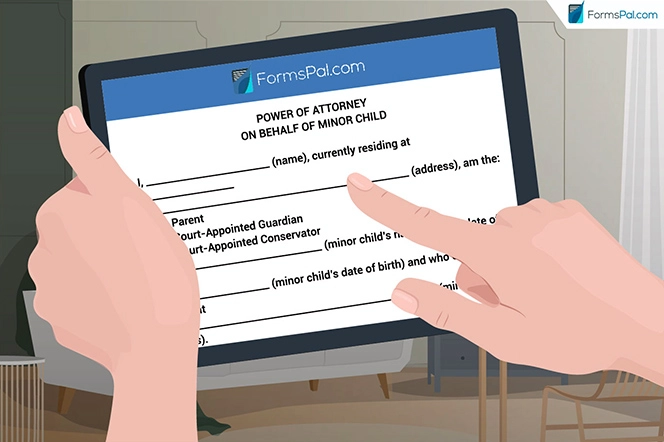
The first step is to find a form that will for your power of attorney or to consult with a licensed attorney to have a custom form created. A standard form is good enough if you want to grant relatively standard power of attorney, but you may need a customized form if you’re granting a lot of powers or want to limit your POA in a non-standard way.
Step 2: Decide On Your Agent

Since this is a power of attorney for a child, it’s important to make sure that the agent you’re choosing is willing and qualified for the job. It’s often a good idea to pick an agent that is a parent themselves since they’ll be more familiar with what your child needs.
Alternatively, you could select a close family member to authorize as an agent. A godparent may also be a good alternative.
Talk with your agent about the kind of care you would like for your child, the powers you are granting, and how long the POA will last. It’s also a good idea to talk to your child so that they know who has power of attorney and who to contact in an emergency.
Step 3: Customize the Powers Granted

Once you have the document and your agent, you’ll need to customize the powers. It’s common to use a general document to create a power of attorney for a child, so you’ll need to write out the exact power that you want to grant. Remember that you can grant the exact authority you want, you don’t need to give them more or less authority than needed.
Step 4: Sign the POA
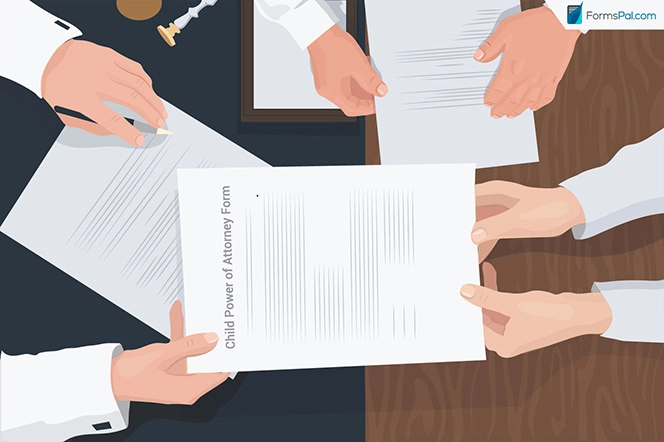
The last step is for your and your child’s agent to sign the POA, preferably in front of a notary public and with witnesses. Be careful to make sure you meet all the signing requirements under state law so that your POA is legally valid.
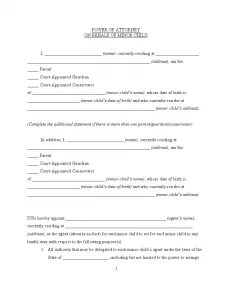
How to Fill Out a Power of Attorney for a Child
For a power of attorney for a child, you usually don’t need the financial authorization you might need for an adult. So, you can choose either a general power of attorney form that lists both kinds of authorization or a general medical POA.
Step 1: Personal Information
The personal information stage is a little different if you’re filling out a power of attorney for the child since you’ll need to list your own name and information, the child’s name, your relationship, and the agent’s personal information.
You can typically modify a general medical POA form to do this. Otherwise, look for a power of attorney form for a child that includes a separate section for each piece of information.
You’ll need to know the street address for yourself, the minor, and the agent you’re designating. You may also want to include contact information on the document.

Step 2: Alternate Agents
If you would like to authorize multiple people as agents, you can use the alternate agent section to decide who will have authority first, and which person gets authority if the primary attorney-in-fact cannot be reached or chooses not to act.
You do not need to authorize an alternate agent, and can use multiple forms to have multiple attorneys-in-fact without stating who is authorized first, second, and so on.

Step 3: Customize Rights and Responsibilities
Our medical POA form includes all of the common medical rights and responsibilities you can authorize. That includes making medical decisions for the principal, including end of life care and choosing between life-extending care and comfort care.
You may want to add things like contact with a school and access to school records to this list, and you may want to limit the medical options you’re granting.
You can add rights or remove them simply by modifying the form before you sign it, or by crossing out any options you don’t want to authorize before signing the document.
Once signed, you’ll need to officially revoke the POA if you want to change it or get rid of some of the included rights and responsibilities.
Consider carefully what permissions you want to grant. For instance, you may want the agent to be able to authorize hospital admittance or even sign off on surgery or other emergency procedure, but not to be able to decide on other matters.
![]()
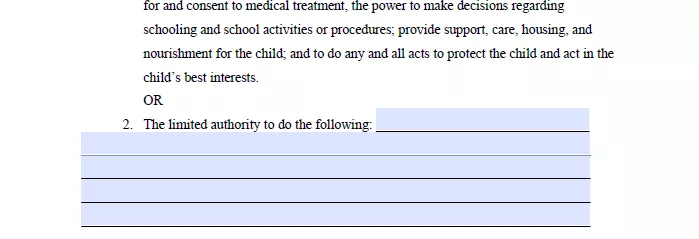
Step 4: Sign and Notarize
The last step is to sign and notarize the entire document before witnesses. That way, your document is more likely to be seen as valid under state law. While it’s unlikely for children’s power of attorney to come under legal scrutiny, it’s important for the document to be as correct as possible to be seen as valid under state law.
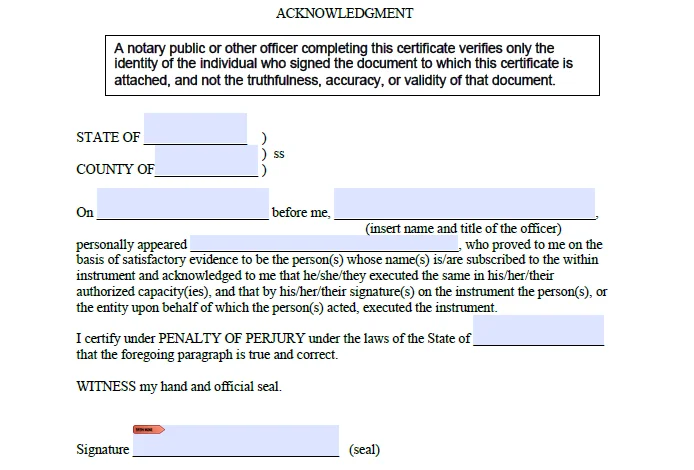
Different states have different requirements for filing POA. In some cases, it may be enough for everyone involved to have a copy of the document, but in other states, you may be required to file the document with the government as well.
